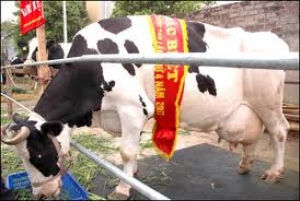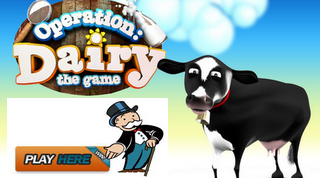Dairy Experts

The research aimed to identify adequate immune parameters and determine their relation with the susceptibility of the individual animal for mastitis, and possibly other health problems as well.
If these immune parameters could be easily determined in milk, routine screening of dairy cows would become possible. Several immune parameters were studied, but natural antibodies (NAb) were the only ones suitable for further study or their relationship with the natural resistance of dairy cows.
Approximately 60 dairy farmers participated in a study under farm conditions to determine whether the natural resistance of cows could be measured based on the presence of antibodies in their milk.
Tosca Ploegaert, PhD student at CBI (cell biology group) and the Animal Breeding and Genomics Centre, conducted the research on behalf of CRV, LTO-Noord and the Udder Health Centre of the Netherlands.
First a literature study was conducted. "We looked for a parameter in the milk which could be used to measure the immunity of cows. An initial experiment then showed that antibodies can be measured accurately in milk. The values remained constant for a longer period and differences were discovered between cows."
The study under farm conditions included cows and heifers up to the first 90 days of lactation. At that point, the probability that the cows had already been sick would be somewhat lower than at a later stage of lactation. Certain antibodies showed a protective effect against mastitis.
Besides conducting the experiment under farm commercial conditions, also data from 2000 heifers (from the Milk Genomics project) whose genetic background was known was analysed. Heritability of NAb was low to moderate.
For 1,515 heifers, clinical mastitis (CM) and high somatic cell count (SCC, indicator for subclinical mastitis) incidence were also known. Furthermore, a field study was conducted to study the effect of NAb on risk for CM, high SCC and other diseases, in both heifers and older cows.
Results suggested that higher levels of certain NAb can decrease the risk for high SCC (in heifers), CM and genital organ, and fertility problems. However, heifers appear to differ from older cows in the relation of their NAb levels with risk for CM and high SCC, and udder health history also affects this relation.
"Natural resistance appears to be largely inherited, data suggests that genetic selection for NAb titers offers possibilities to improve disease resistance of dairy cows."
Ms Ploegaert will soon defend her PhD thesis on Parameters voor natuurlijke weerstand in rundermelk (Parameters for natural resistance in cow milk).The follow-up research to this study has already begun as part of a new project called Weerbaar Vee (Robust Cattle), which is financed by the Ministry of Economic Affairs, Agriculture and Innovation, the Dutch Dairy Board, Wageningen UR, CRV, LTO projects and the Animal Health Service Deventer.





















